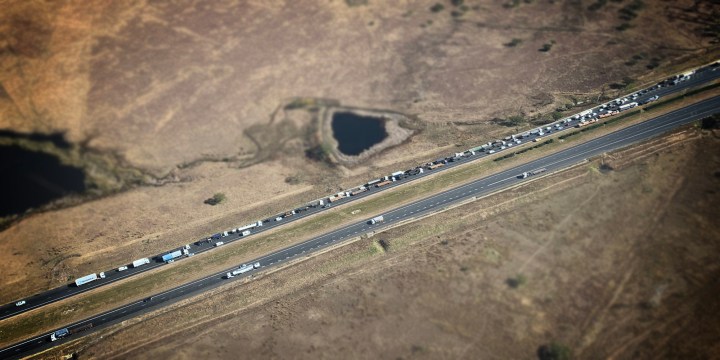HIGHWAY TO HELL
N3 truck blockade in KZN an ‘act of economic sabotage’ – Durban commerce chamber

Traffic on the N3 started flowing again on Thursday evening after a day of blockades by trucks seriously disrupted traffic on the normally busy Van Reenen’s Pass. The blockade shut down the critical supply chain route that connects KwaZulu-Natal to the interior of the country.
The Durban Chamber of Commerce and Industry on Thursday night called the truck blockade on the N3 “an act of economic sabotage”.
“Such behaviour cannot become a norm for addressing social issues in South Africa when so many other functional platforms exist.
“These acts cannot only be viewed as acts of sabotage towards the businesses directly affected, but this affects all members of society due to the far-reaching economic consequences.”
The congestion and road closures along the N3 were increasing, said chamber president Palesa Philli in a statement, and “should no longer be tolerated”.
“These factors create uncertainty and delays in freight turnaround times, creating additional costs for businesses and other economic problems.”
According to Zinhle Mngomezulu, KZN spokesperson for the Road Traffic Inspectorate, drivers began blocking the N3 before 5am on Thursday. Many abandoned their trucks on both carriageways and removed the keys, a common tactic of protesting truckers.
She said there were about 200 vehicles involved in the blockade.
In another protest near Tweedie in the Howick area, three trucks blocked the northbound lane.
“We called in breakdown trucks and impounded the vehicles at our testing centre. The owners must take responsibility. They must pay to get the trucks back.”
While the police were there to assist, their numbers were “moderate”, said Mngomezulu. “Not what we would have wanted.”
Several long-haulers obstructed other regional roads, making it near impossible in some areas to find alternative routes.
The national trucker strike had been threatened for at least a week via WhatsApp, with “local” drivers and truck owners demanding to be given priority over foreign nationals when it came to jobs in the industry – a common refrain over the years.
Police said they had arrested four men in connection with the protest. They would be charged with obstructing a national route, damaging or interfering with essential infrastructure, and economic sabotage.
More arrests were expected, according to KZN senior SAPS spokesperson Brigadier Jay Naicker.
Blocking roads and torching trucks on the N3 is not a new phenomenon in KwaZulu-Natal. For at least the past five years, hundreds of trucks have been set alight during protests by local truckers. Others have been looted.
The All Truck Drivers’ Forum (ATDF), responsible for numerous blockades along the N3 in the past, denied involvement in Thursday’s protest.
The ATDF is part of a loose coalition of disgruntled “locals” that includes MK veterans and so-called business forums, which are outspoken about the hiring of foreign nationals in the province.
While the latter have called for violence against foreign nationals in the past, and attacked foreign shop owners in parts of Durban, the ATDF makes a point of publicly distancing itself from acts of violence, vandalism or sabotage.
ATDF secretary Sifiso Nyathi told Daily Maverick on Thursday evening that it “supports the strike”.
Nyathi said he was speaking from Bloemhof in North West, where “hundreds” of trucks were also gathering. The national protest was gaining momentum, he said.
“This [protest] was not planned by ATDF … it was planned by South African drivers. When I got to Bloemhof, the road was already closed. We support them,” he said.
Pressed on ATDF’s involvement in coordinating the protest, Nyathi laughed: “I really don’t know who organised it. It’s just South African drivers … the people of South Africa, you know.”
The ATDF had engaged with government and large trucking organisations for the past five years, said Nyathi, “and nothing has changed”.
“We won’t move until our demands are met,” he said, adding that this is what he had been told by “the protesters”.
He said the strike was the fault of South Africa’s road freight industry, which had consistently ignored requests and demands that locals be hired over foreigners.
Unregulated labour that was “cheap and foreign” was a stumbling block to the growth of the economy, he said, scuppering employment opportunities for the country’s youth.
A ministerial task team has, in the past, been convened to deal with the flare-ups in truck-related violence, blockades and the demands made by local truckers, but it has borne little fruit.
This week, we continued our engagements with truck drivers until late on Tuesday, 14 June 2022 and we believe we are on the verge of concluding an agreement on the proposed interventions. pic.twitter.com/ONvtPMdv6i
— FIKILE MBALULA | MR FIX (@MbalulaFikile) June 16, 2022
Nyathi has previously told this journalist that the task team, and government, were “useless”.
In December 2020, after similar protests, KZN premier Sihle Zikalala said that following a meeting with stakeholders in the trucking sector, it was, in principle, agreed that “truck operators must with immediate effect prioritise the employment of South African drivers”.
It was also agreed, among other things, that foreign nationals driving South African-registered trucks must “hold a valid permit issued by the Department of Home Affairs”, Zikalala said at the time.
He said this new “roadmap” would “bring stability and end the impasse that is crippling the economy and investments”. It was a stopgap measure, said Zikalala, until appropriate amendments could be made to the law.
Two years later, and according to Nyathi: “Government has never tried to solve this problem thoroughly. It just has to enforce the law.”
There is no law banning foreign nationals from driving trucks or working in South Africa.
Philli said the Chamber believed that “collaboration between government and the private sector is critical to solving these challenges”.
“We encourage the government to review the labour legislative framework and the Immigration Act. Along with all other operational and administrative costs, the cost of employment for small businesses is currently high and businesses have no option but to employ documented foreign nationals as independent contractors.
“Nonetheless, amicable and reasonable negotiations and discussions should always be held first by all stakeholders involved.”
The transport ministry has confirmed a meeting with stakeholders on Sunday, 19 June.
* By Friday, the N12 between Bloemhof and Schweizer Reneke had been opened, according to North West community safety and transport management department spokesperson Boitshoko Moremi. Community safety and transport management MEC Sello Lehari thanked road users for their cooperation and congratulated law enforcement officers for ensuring the safety of everyone. DM
* This article was updated with new developments at 1.40pm on Friday, 17 June 2022.

















 Become an Insider
Become an Insider
More blah, blah, blah on this issue which the state has done nothing to FIX. There is an epidemic of stakeholders in SA who seem to do little more than hold stake and call it fixing the broken. When will our government govern?
Truckers do not generally own the trucks they drive, so whose trucks were used for the blockade? Whose trucks are burnt? Who are these drivers? Where is police intelligence? And most importantly, WHERE ARE THE TRAINS? All MIA. Except of course for mr Breakitall Mbabula, the Minister of NoTransport, who is forever on the brink of a breakdown… sorry, breakthrough.
“ Nyathi has previously told this journalist that the task team, and government, were “useless”. ” Now there’s a surprise. How come this has been a common refrain for years yet the ANC remains in charge? Majority of SA voters clinically insane as they keep doing the same thing but hoping for a different outcome.
I agree but then the job is now for all who claims intelligence to convince @ least one voter to vote one & then for change. You believe in democracy or join the truckers
I remember listening to the radio on this issue. Data that had been collected and it was established that only 30% of truck drivers on SA roads were foreign. Most of the trucks they drove, went from SA into other African countries. This article makes me feel hopeless, because there is nothing about who and how this is being worked on. Talk about the stats, then groups like ATDF can’t just claim that nothing is being done. This story is typical of the ‘bad news sells’ scenario. Not up to the usual Daily Maverick content. Change the narrative with facts.
While the police were there to assist, their numbers were “moderate”, said Mngomezulu. “Not what we would have wanted.”
Nyathi has previously told this journalist that the task team, and government, were “useless”.
Says it all really
These so called business forums are nothing but criminal organisations driving their own criminal agenda’s, the leader just happened to be in Bloemhof where a blockade was going on, yeah right, like in the construction industry they’re just economic terrorists looking after their own financial interests
And so the RET truck brigade strikes again. Nothing to do with foreign truck drivers. maybe the driver who blocks the road thinks so but the leaders have different agendas!